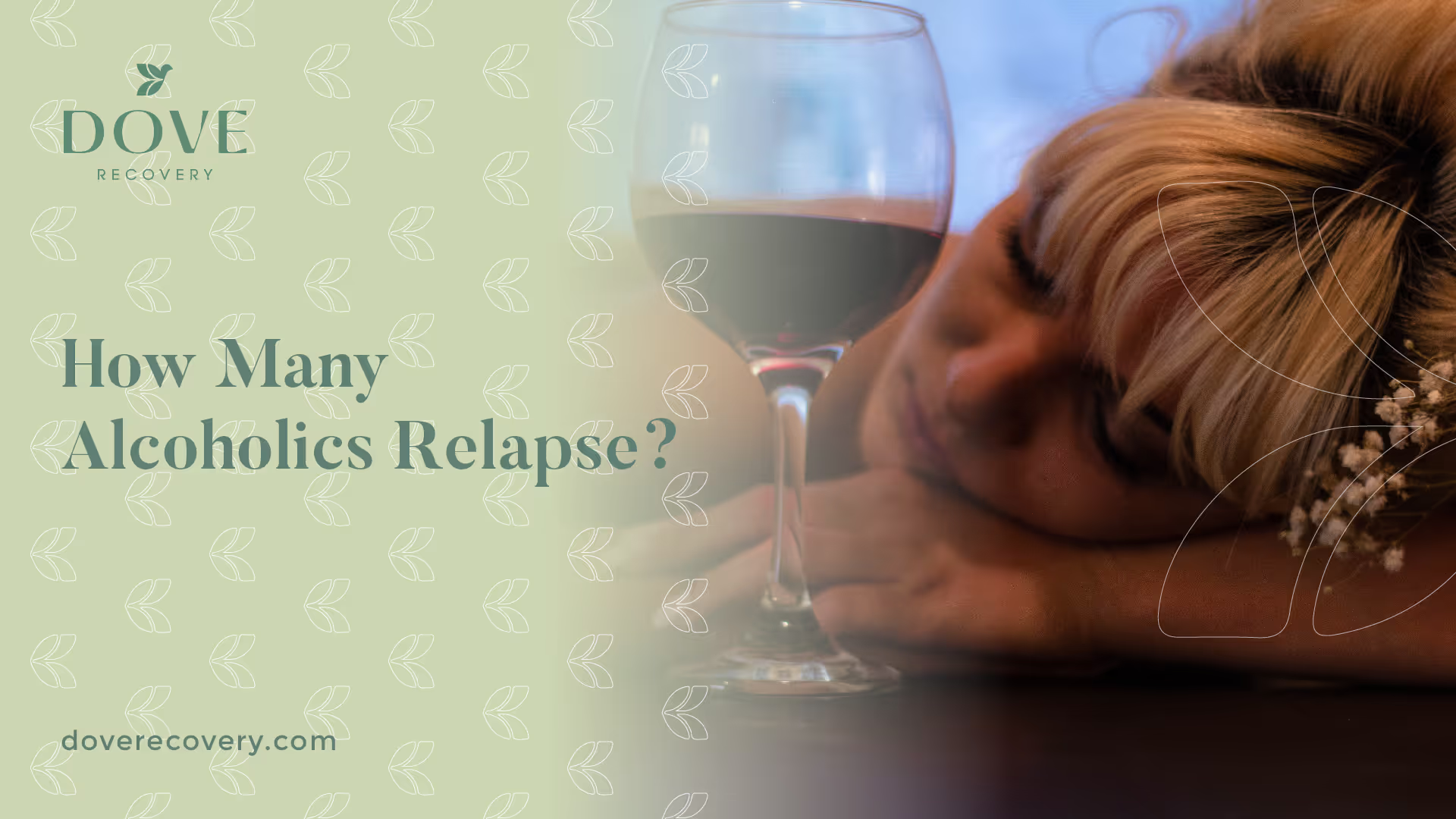Alcohol Relapse Rates & Recovery Statistics

Alcohol Relapse Rates, Abstinence & Recovery Statistics
Alcoholism is a chronic disease that affects millions of people around the world. While many individuals are able to overcome their addiction and lead a sober life, others struggle with relapse. In fact, research shows that relapse rates for alcoholics can be as high as 50-60%. In this article, we will explore alcohol relapse statistics and what they mean for those struggling with addiction.
What is Alcohol Relapse?

Alcohol relapse is defined as a return to alcohol use after a period of sobriety. It is a common occurrence in addiction recovery, and can happen for a variety of reasons. Some individuals may experience triggers that lead them to drink, while others may simply struggle with the day-to-day challenges of living a sober life. Regardless of the reason, relapse can be a setback for those in recovery.
Alcohol Relapse Rates & Abstinence Statistics
The National Institute on Alcohol Abuse and Alcoholism (NIAAA) reports that a significant proportion of individuals who have undergone treatment for alcohol use disorder will relapse within the first year:
- Between 40-60% of treated individuals will relapse within the first year, according to NIAAA.
- In comparison, the relapse rates for other chronic diseases, such as hypertension and asthma, are significantly lower.
Moreover, research indicates that the likelihood of relapse decreases as an individual remains sober for longer periods of time:
- One study found that individuals who had been sober for less than a year had a relapse rate of 65%.
- Conversely, those who had been sober for more than five years had a relapse rate of just 15%.
What Percentage Of Alcoholics Relapse?
Alcohol addiction is a complex and challenging condition, and understanding the likelihood of relapse is important for those seeking treatment. The National Institute on Alcohol Abuse and Alcoholism (NIAAA) reports that:
- Between 40-60% of treated individuals will relapse within the first year, even with professional treatment.
- Relapse rates can vary depending on the individual's level of dependence, age, and mental health status.
- One study found that individuals with severe alcohol use disorder had a higher likelihood of relapse compared to those with less severe forms of the disease.
Moreover, research suggests that certain populations may be at higher risk for relapse:
- Individuals who have experienced trauma or have a history of depression may be more vulnerable to relapse.
Despite these challenges, it's important to remember that recovery is possible. With the right support and resources, many people are able to overcome their addiction and lead fulfilling lives in sobriety.
Types Of Alcohol Relapses
There are three types of alcohol relapses: slip, lapse, and relapse. A slip is a brief and isolated incident of drinking that does not necessarily lead to a full-blown relapse. A lapse, on the other hand, is a more prolonged episode of drinking that can last for days or weeks. Finally, a relapse is a complete return to alcohol use and all its negative consequences.
Alcohol Relapse Rates
Studies have shown that slips and lapses are common occurrences in the recovery process. For example:
- One study found that 75% of individuals who were attempting to quit drinking experienced at least one slip within the first year.
- Another study found that while 90% of individuals who attempted to quit drinking had at least one lapse, only 60% went on to experience a full-blown relapse.
- Additionally, research shows that those who experience slips or lapses are more likely to return to abstinence than those who experience a full-blown relapse.
Understanding these different types of alcohol relapses can help individuals in recovery prepare for potential setbacks and stay motivated on their journey towards sobriety.
How Many Alcoholics Relapse?

Individuals struggling with alcohol addiction may wonder about the likelihood of relapse. Research suggests that:
- Up to 90% of individuals diagnosed with alcohol use disorder experience at least one relapse within the first four years of recovery, according to one study.
- The likelihood of relapse can vary depending on an individual's level of dependence, age, and mental health status.
- Older adults may be more vulnerable to relapse due to changes in their social support networks or physical health issues.
- Those with co-occurring mental health conditions like depression or anxiety may be more likely to struggle with ongoing substance abuse.
When Is Alcohol Relapse Most Likely?
While relapse can happen at any time during the recovery process, research suggests that there are certain periods when individuals may be more vulnerable to returning to alcohol use. One study found that the highest risk for relapse occurs within the first three months of sobriety. During this period, individuals may still be adjusting to life without alcohol and may not have developed effective coping mechanisms for dealing with triggers or cravings.
Another study found that individuals who experience a major life stressor, such as a divorce or job loss, are also at higher risk for relapse. In fact, researchers found that individuals who experienced a significant stressor were 2.5 times more likely to relapse compared to those who did not.
It's important to note that each individual's journey in recovery is unique and there is no one-size-fits-all approach to preventing relapse. However, understanding the factors that can increase the likelihood of returning to alcohol use can help individuals develop strategies for managing their recovery and avoiding triggers.
Alcohol Recovery Statistics
- A study published in the Journal of Substance Abuse Treatment found that individuals who had been sober for less than three months had a relapse rate of 36%.
- In comparison, those who had been sober for six months or longer had a relapse rate of just 18%.
- Another study found that individuals who experienced a major life stressor within the past year were twice as likely to relapse compared to those who did not experience a stressor.
Chance of Relapse After Alcohol Rehab
While alcohol rehab can be an effective way for individuals to overcome their addiction, it is important to understand that relapse is still a possibility. Research suggests that the likelihood of relapse after completing alcohol rehab can vary depending on a variety of factors, including:
- The individual's level of dependence
- The length and intensity of their treatment program
- The presence of co-occurring mental health conditions
According to one study, the chance of relapse after completing alcohol rehab is approximately 40-60%. However, this number can vary depending on the individual's circumstances. For example:
- Individuals who have completed a longer treatment program may have a lower likelihood of relapse compared to those who only received brief intervention.
- Those with more severe forms of alcohol use disorder may be at higher risk for relapse compared to those with less severe forms.
It's important to remember that relapse does not mean failure and that recovery is an ongoing process. With continued support and resources, individuals can overcome setbacks and continue on their journey towards sobriety.
Alcohol Rehab Relapse Statistics
- A study published in the Journal of Substance Abuse Treatment found that individuals who completed a 90-day treatment program had a lower likelihood of relapse compared to those who completed shorter programs. Specifically, those who completed a 90-day program had a one-year sobriety rate of 63%, while those who completed shorter programs had a one-year sobriety rate of just 42%.
- Another study found that individuals with co-occurring mental health conditions were more likely to experience relapse after completing alcohol rehab. Specifically, those with depression had a one-year sobriety rate of just 36%, while those without depression had a one-year sobriety rate of 52%.
What Percentage of Alcoholics Recover and Stay Sober?

While relapse rates for alcoholics can be high, it's important to remember that recovery is possible. According to the National Institute on Alcohol Abuse and Alcoholism (NIAAA), approximately one-third of individuals who have been treated for alcohol use disorder are able to recover and maintain long-term sobriety.
Moreover, research suggests that certain factors may increase the likelihood of successful recovery:
- Individuals who receive professional treatment for their addiction are more likely to achieve long-term sobriety compared to those who do not.
- Those with a strong support system, including family members and friends who are supportive of their sobriety, may also have an easier time maintaining their recovery.
- Engaging in activities that promote overall health and well-being, such as exercise or meditation, may help individuals manage stress and avoid triggers.
- A study published in the Journal of Substance Abuse Treatment found that individuals who received professional treatment had a higher likelihood of achieving long-term sobriety compared to those who did not. Specifically, those who participated in an intensive outpatient program had a one-year sobriety rate of 60%, while those who only received brief intervention had a one-year sobriety rate of just 20%.
- Another study found that individuals with a strong support system were more likely to maintain their recovery over time. Specifically, those with high levels of social support had a five-year sobriety rate of 64%, while those with low levels of social support had a five-year sobriety rate of just 44%.
Risk Factors for Alcohol Relapse
While relapse can happen to anyone in recovery, certain factors can increase an individual's risk of returning to alcohol use. These risk factors include:
- Stressful life events, such as job loss or divorce
- Mental health conditions, such as depression or anxiety
- Lack of social support
- Exposure to triggers, such as being in environments where alcohol is present
Preventing Alcohol Relapse
While relapse can be a setback in addiction recovery, it is important to remember that it is not a failure. It is simply a part of the recovery process. That being said, there are steps that individuals can take to reduce their risk of relapse. These steps include:
- Seeking ongoing support, such as therapy or support groups
- Developing healthy coping mechanisms to manage stress and other triggers
- Avoiding situations where alcohol is present
- Building a strong support system of friends and family
Conclusion
In conclusion, alcohol relapse is a common occurrence in addiction recovery, and the statistics can be discouraging. However, it's important to remember that relapse is not a failure and does not mean that an individual cannot achieve sobriety. With the right support and resources, individuals can overcome their addiction and lead fulfilling lives in sobriety.
Understanding the risk factors for alcohol relapse and developing healthy coping mechanisms can go a long way in preventing a setback on the journey towards recovery. It's crucial for those struggling with alcohol addiction to seek professional help and build a strong support system of friends and family who can offer encouragement and understanding throughout the recovery process.
Sources:
- National Institute on Alcohol Abuse and Alcoholism. (2020). Understanding Alcohol Use Disorder.
- Alcohol.org. (2021). Alcohol Relapse Rates & Statistics.
- National Institute on Drug Abuse. (2020). Principles of Drug Addiction Treatment: A Research-Based Guide (Third Edition).
